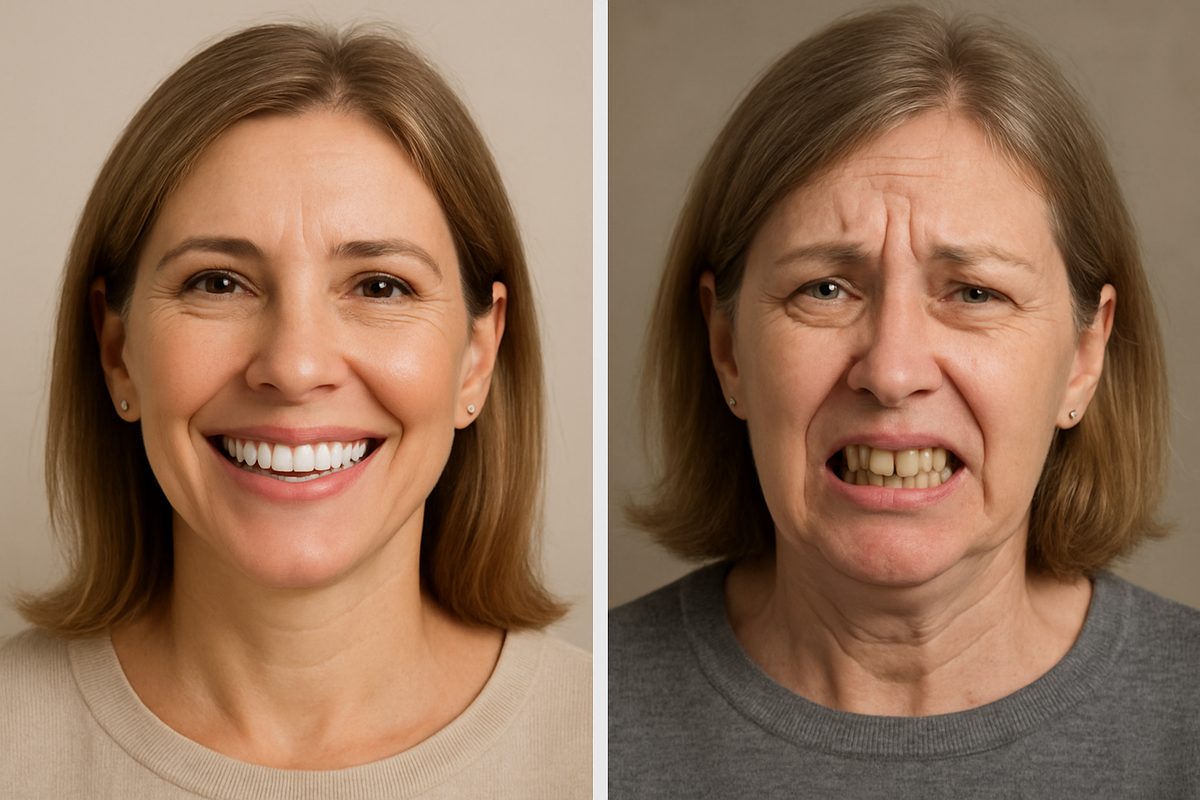Many people use the term “fake teeth inserts” to describe removable dental options like dentures, partials, flippers, or temporary bridges. These appliances can replace missing teeth quickly and at a lower upfront cost, which makes them appealing in certain situations. However, they are not designed to function like natural teeth long term.
Dental implants offer a more stable, durable alternative that restores chewing ability, supports jaw health, and feels closer to real teeth. At West Dentistry in Jacksonville, FL, patients often come to us after struggling with removable appliances and want to understand whether implants are the right next step.
This guide explains what fake teeth inserts are, why people choose them, their common drawbacks, and how dental implants can replace them safely and effectively.
What Are “Fake Teeth Inserts”?
Fake teeth inserts is a non-clinical term commonly used to describe removable tooth replacement options, including full dentures, partial dentures, flippers, and temporary bridges. These appliances rest on the gums or attach to remaining teeth using clasps.
They are typically chosen because they can be made quickly, do not require surgery, and cost less upfront than permanent solutions. For short-term tooth replacement—such as after extractions or while planning more definitive care—they can serve a temporary purpose.
Why People Choose Fake Teeth Inserts
The main reasons patients choose removable inserts are speed, affordability, and convenience. These appliances can often be fabricated in days or weeks and don’t involve surgical procedures.
For patients who need an immediate cosmetic solution or are unsure about committing to implants, fake teeth inserts may feel like a practical starting point. However, many patients eventually experience limitations that prompt them to explore alternatives.
Common Problems With Fake Teeth Inserts
Fit, Movement, and Confidence
Removable appliances can shift while talking or eating, which affects speech clarity and chewing comfort. Adhesives may help temporarily, but they do not fully eliminate movement.
Bone Loss and Facial Changes
Fake teeth inserts do not stimulate the jawbone. Over time, the bone beneath the appliance shrinks, which can cause the denture to loosen and contribute to a sunken facial appearance. This bone loss can also make future tooth replacement more complex.
Comfort and Hygiene Challenges
Removable appliances may cause sore spots or irritation and can be harder to clean thoroughly. Reduced chewing efficiency may also limit diet choices and affect overall nutrition.
How Dental Implants Replace Fake Teeth Inserts
Dental implants use biocompatible titanium posts placed into the jawbone. These posts fuse with the bone through a process called osseointegration, creating a stable foundation for replacement teeth.
Because implants replace the tooth root as well as the visible tooth, they provide superior stability, improve chewing strength, and help preserve jawbone health. Implant restorations feel more natural and do not rely on adhesives or clasps.
Types of Implant Restorations
Dental implants can be customized based on how many teeth are missing and where:
- Single implant crowns for one missing tooth
- Implant-supported bridges for several missing teeth in a row
- Implant-retained full-arch solutions (such as All-on-4-style treatments) to replace an entire upper or lower arch
Your dentist will recommend the option that best fits your anatomy, goals, and long-term oral health.
Who Is a Good Candidate to Replace Fake Teeth Inserts With Implants?
Good candidates are generally in good overall health, have controlled gum disease, and sufficient jawbone to support implants. If bone volume is low, procedures such as bone grafting or sinus lifts may be recommended to prepare the site.
A comprehensive dental exam, digital imaging, and health review are essential to determine candidacy and design a safe treatment plan.
The Dental Implant Process: What to Expect
Treatment begins with a consultation and digital scans. The implant post is placed surgically, followed by a healing period—typically several months—while the implant integrates with the bone.
Once healing is complete, a custom crown, bridge, or denture is attached. Most implant cases are completed in stages over three to six months, depending on the complexity of treatment.
Costs, Insurance, and Maintenance
The cost of dental implants varies based on the number of implants, need for preparatory procedures, and type of restoration. Dental insurance may help cover portions of treatment, and financing options can make implants more accessible.
Implants require daily brushing and flossing, along with routine dental visits. With proper care, they often last for decades—far longer than removable inserts.
Replacing Fake Teeth Inserts at West Dentistry in Jacksonville
West Dentistry offers a streamlined approach to implant care with digital imaging, an on-site surgical suite, and an on-site oral surgeon, Dr. Victor Erminy. Led by Dr. Jacqueline West, the practice focuses on personalized planning, comfort, and coordinated care under one roof.
Patients benefit from a spa-like environment, online scheduling, and financing options that support a smooth transition from removable inserts to implant-based solutions.
Next Steps: Is It Time to Move Beyond Fake Teeth Inserts?
If your removable teeth slip, cause irritation, or you’re concerned about bone loss, it may be time to explore dental implants. An evaluation can clarify your options and help you choose a solution that supports long-term comfort and oral health.
Contact West Dentistry in Jacksonville, FL to schedule a dental implant consultation and learn whether implants are right for you.

